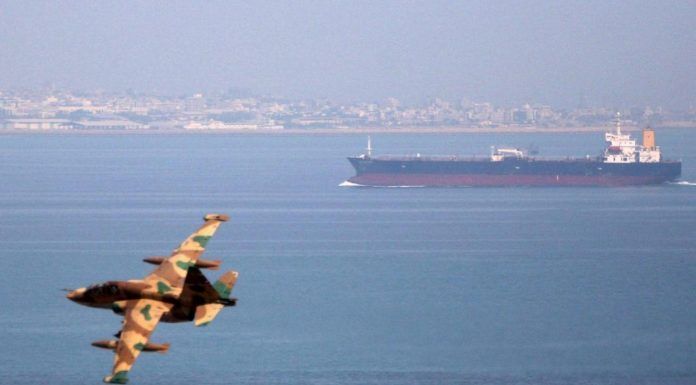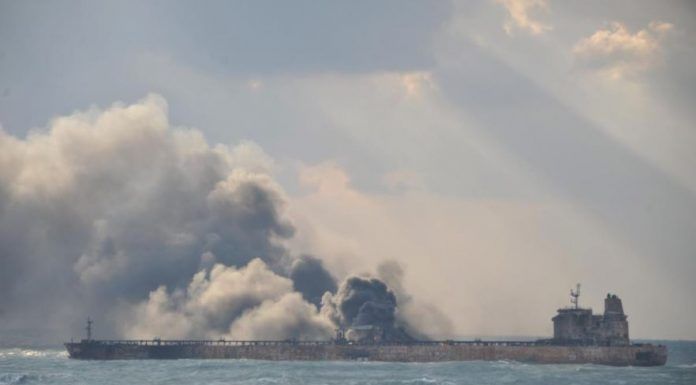March 6 – U.S. political and economic pressures have successfully dissuaded many countries from buying Iranian oil, the German newspaper Die Welt wrote in an editorial published March 5. Citing VesselsValue, a London-based online valuation and market intelligence service for the maritime and offshore sectors, the paper said that Iran’s largest oil importers had significantly reduced their business dealings with the country in response to U.S. sanctions.
“The top five customers of Iranian crude [China, India, South Korea, Turkey, and Italy] have stopped buying oil from Iran. Iran’s efforts to sell its oil using secret channels and unconventional methods have harmed the environment and endangered many lives,” Die Welt said.
According to the paper, the National Iranian Tanker Company (NITC) has the world’s second largest fleet of oil tankers after Saudi Arabia. Some supertankers and ultra-large crude carriers (ULCC) are 550,000 in deadweight tonnage (DWT) and can carry up to two million 159-liter oil barrels. Most of these tankers, however, have anchored in various ports and cannot deliver their cargo. Nowadays, they function more like storage facilities than carriers.
“South Korea and France have almost stopped all oil imports from Iran,” Welt editorial said, quoting Court Smith, a trade analyst at VesselsValue. “China, India, and Japan imported a total of 1.31 million barrels per day (bpd) in 2018, down 21 percent from the previous year. While India and Japan have all but stopped buying Iranian oil since January 2019, China has dropped its import by another ten percent.”
According to Die Welt, France, Turkey, and Italy used to be the biggest importers of Iranian Crude. They have, however, been buying their oil from the U.S., Saudi Arabia, and Russia, which have filled the vacuum after the elimination of Iran from the market.
“The situation in Iran has contributed to a price hike,” Die Welt noted, citing Rainer Wiek, editor-in-chief of the Energy Information Service (EID). “Brent crude was being traded at as much as $67 a barrel at the end of February.”
Die Welt noted that the U.S. Treasury Department’s Office of Foreign Assets Control (OFAC) had been very aggressive in its efforts to penalize any country that violated economic sanctions against Iran. Many EU member countries, however, are still trying to circumvent the U.S. sanctions against Iran, it said.
The collision of the Iranian oil tanker Sanchi with the Hong Kong-flagged cargo ship CF Crystal in the East China Sea on January 6, 2018 was an example of Tehran trying to sell its oil through secret and illegal channels, Die Welt said. At the time of the collision, Sanchi was reportedly transporting 136,000 tons (960,000 barrels) of crude and highly flammable natural-gas condensate, destined for South Korea. All 30 Iranians and two Bangladeshi crew members perished in the collision and subsequent explosion and fire that lasted more than a week. According to many reports, the incident caused a massive oil spill covering an area of 40 square miles. Many species of fish choose the location to spawn every year. It also provides a corridor through which whales migrate.
According to maritime authorities, 24 hours before the incident, Sanchi had stopped transmitting its locations to naval tracking systems. It is unclear whether the Automatic Identification Signals (AIS) shutdown was intentional or a fault in the system.
Iranian oil tankers have been sending false AIS, according to Welt, citing a report by the Canadian Broadcasting Corporation (CBC). The international maritime authorities have corroborated the claim.
The AIS tracking systems implemented in recent years under an International Convention would allow maritime authorities, ports and coast guards to identify ship traffic via vessel tracking systems (VTS). It appears that Iranian tankers have been using Tanzanian flagships’ AIS signals to conceal voyages to Syria.
Translated from Persian by Fardine Hamidi



